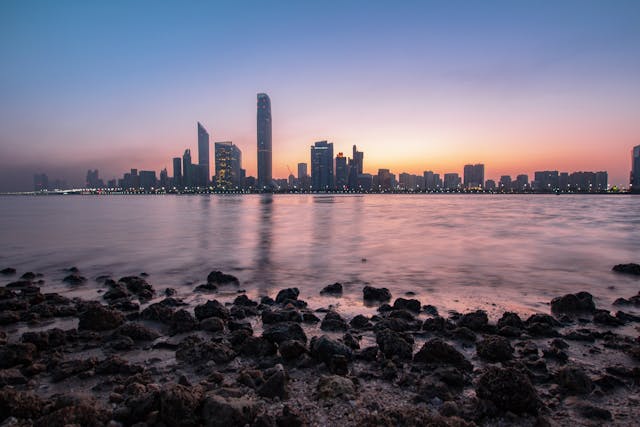When people think of the United Arab Emirates (UAE), Dubai and Abu Dhabi often come to mind as the two most prominent cities. Both are known for their stunning architecture, luxurious lifestyle, and economic prowess. However, one common question that arises is: Is Dubai bigger than Abu Dhabi? To answer this, we need to look at different aspects such as area, population, economy, and cultural significance.
Geographical Size
In terms of geographical size, Abu Dhabi is significantly larger than Dubai. Abu Dhabi is not only the largest emirate in the UAE but also the capital. Covering about 67,340 square kilometers, Abu Dhabi makes up about 87% of the total land area of the UAE. This vast expanse includes a diverse range of landscapes, from deserts to coastlines.
On the other hand, Dubai is much smaller, covering an area of approximately 4,114 square kilometers. Despite its smaller size, Dubai has maximized its space with impressive urban development, making it appear larger than it is due to its high-rise buildings and extensive infrastructure.
Population
When it comes to population, Dubai takes the lead. As of recent estimates, Dubai has a population of around 3.5 million people. This makes it the most populous city in the UAE. The city has experienced rapid population growth over the past few decades, driven by its booming economy, tourism, and status as a global business hub.
Abu Dhabi, while being larger in area, has a smaller population of about 1.5 million people. The population density in Abu Dhabi is much lower compared to Dubai, largely because a significant portion of Abu Dhabi’s land area is desert and less densely developed.
Economic Comparison
Economically, both cities are powerhouses, but they excel in different areas. Dubai’s economy is highly diversified, with significant contributions from tourism, real estate, aviation, and financial services. The city is home to the world’s tallest building, the Burj Khalifa, and hosts numerous international events, making it a major global city.
Abu Dhabi, in contrast, has an economy that heavily relies on oil and gas. The emirate holds about 95% of the UAE’s oil reserves and approximately 92% of its gas reserves. This natural wealth has allowed Abu Dhabi to build a robust economy and invest heavily in infrastructure, education, and cultural projects. Recently, Abu Dhabi has also been diversifying its economy, investing in sectors such as renewable energy, technology, and tourism.
Cultural and Social Life
Culturally, both cities offer rich and diverse experiences but in different ways. Dubai is known for its cosmopolitan lifestyle, with a large expatriate population from all over the world. This diversity is reflected in its food, festivals, and daily life. Dubai hosts numerous international sporting events, music concerts, and art exhibitions, making it a vibrant city.
Abu Dhabi, while also cosmopolitan, has a more traditional Emirati feel. It is home to several cultural landmarks, such as the Sheikh Zayed Grand Mosque and the Louvre Abu Dhabi. The city places a strong emphasis on preserving Emirati culture and heritage, with various museums, cultural festivals, and heritage sites.
Infrastructure and Development
In terms of infrastructure and development, both cities are highly advanced. Dubai is famous for its futuristic skyline, world-class airports, and extensive public transport systems, including the Dubai Metro. The city has also developed numerous man-made islands, such as the Palm Jumeirah and the World Islands.
Abu Dhabi, while less flashy, boasts impressive infrastructure as well. The city has developed world-class roads, bridges, and ports. Yas Island in Abu Dhabi is a major tourist destination, featuring attractions like Ferrari World, Yas Marina Circuit, and Yas Waterworld.
Tourism
Tourism is a major industry in both cities, but they attract different types of tourists. Dubai is known for its luxury shopping, ultramodern architecture, and lively nightlife. Attractions such as the Burj Khalifa, Dubai Mall, and Dubai Fountain draw millions of visitors each year. Dubai’s hospitality sector is renowned for its luxury hotels and resorts.
Abu Dhabi, on the other hand, offers a more laid-back and cultural tourist experience. Visitors come to see the Sheikh Zayed Grand Mosque, one of the largest mosques in the world, and the Louvre Abu Dhabi, an art and civilization museum. Abu Dhabi also has beautiful natural attractions like the Liwa Desert and various mangrove forests.
Living Standards
Both Dubai and Abu Dhabi offer high living standards, but there are differences. Dubai is known for its fast-paced lifestyle and is often seen as the place for young professionals and entrepreneurs. The cost of living in Dubai can be high, particularly in terms of housing and schooling.
Abu Dhabi offers a more relaxed pace of life and is often preferred by families and long-term residents. The cost of living in Abu Dhabi is generally lower than in Dubai, especially regarding housing. Both cities provide excellent healthcare, education, and public services.

